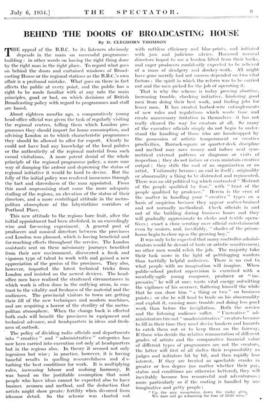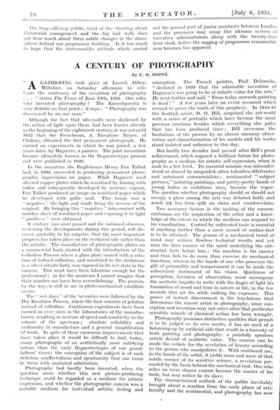BEHIND THE DOORS OF BROADCASTING HOUSE
By D. CLEGHORN THOMSON
THE appeal of the B.B.C. to its listeners obviously depends in the main on successful programme- building : in other words on having the right thing done by the right man in the right place. To regard what goes on behind the doors and curtained windows of Broad- casting House or the regional stations as the B.B.C.'s own affair is a profound mistake. What goes on there in fact affects the public at every point, and the public has a right to be made familiar with at any rate the main principles, good or bad, on which decisions of British Broadcasting policy with regard to programmes and staff are based.
About eighteen months ago, a comparatively young head-office official was given the task of regularly visiting the regional centres, telling thein which London pro- grammes they should import for home consumption, and advising London as to "which characteristic programmes they should be allowed to offer for export. Clearly he could not have had any knowledge of the local palates or the authenticity of the regional material from such casual visitations. A more patent denial of the whole principle of the regional programme Policy, a more sure way of damping the ardour and depreSsing the status of regional initiative it would be hard to devise. But the folly of the initial policy was rendered innocuous through the tact and shrewdness of the man appointed. From this most .unpromising start came the more adequate staffing of the regions, an elevation of the status of their directors, and a more centrifugal attitude in the metro- politan atmosphere of the labyrinthine corridors of Portland Place.
This new attitude to the regions bore fruit, after the initial appointment had been abolished, in an.exCeedingly wise and far-seeing experiment. A general post of producers and musical directors between the provinces and London was planned, which is having beneficial and far-reaching effects throughout the service. The London assistants sent on these missionary journeys benefited from their new environment, discovered a fresh and vigorous type of talent to work with and gained a new appreciation of the genius of the provinces. They also, however, imported the latest technical tricks from London and insisted on the newest devices. The head- office men have realized the straitened circumstances in which work is often done in the outlying areas, in con- trast to the vitality and freshness of the material and the audiences. The provincial visitors to town are getting their fill of the new techniques and modern machines, and are acquiring a horror of the sterility of the metro- politan atmosphere. When the change back is effected both ends will benefit the provinces in equipment and :technical advance, and headquarters in ideas and fresh- ness of. outlook.
The policy of dividing radio officials and departments into " creative " and " administrative " categories has now been carried into execution not only at headquarters but in the regions also. In. theory it .seemed- not only ingenious but wise ; in practice, however, it is having baneful results in quelling resourcefulness and (I's- turbing the best conditioris for work. It is multiplying rules, increasing labour and undoing harmony.t most people based on the justifiable assumption that people who have ideas cannot be expected also to have busines : acumen and method, and the deduction that artists might show greatei fertility when divorced from irksome detail. So the Schenie was charted out with ruthless efficiency and blue-prints, and initiated with jam and judicious advice. Harassed musical directors hoped to see a burden lifted from their backs, and eager producers confidently expected to be relieved of a mass of drudgery and donkey-work. All might have gone merrily had not success depended on two vital factors : the spirit -in which the reform was to be carried out and the men picked for the job of operating it.
That is why the scheme is today proving abortive, increasing trouble, checking initiative, hindering good men from doing their best work, and finding jobs for lesser men. It has created barbed-wire entanglements of new rules and regulations which waste time and create unnecessary irritation in themselves—it has not really cleared the way for creators at all. So many of the executive officials simply do not begin to under- stand the handling of those who are handicapped by the possession of artistic temperament or creative proclivities. Barrack-square or quarter-deck discipline and method may save money and induce neat sym- metrical external patterns or diagrams or visits of inspection ; they do not induce or even maintain creative output : they stifle the soul of an organization or an artist. Uniformity becomes an end in itself ; originality or abnormality a thing to be distrusted and regimented. There was an old political tag which contrasted " Mistrust of the people qualified by fear," with " trust of the people qualified by prudence." Herein is the crux of the matter in handling your " creative " types on a basis of suspicion because they appear scatter-brained and not normally methodical. Cheek officials in and out of the building during business hours and they will gradually approximate to clerks and textile opera- tives ; exact a close scrutiny over official entertainment even by seniors, and, inevitably, " shades of the prison- house begin to close upan the growing boy."
It was only to be expected that many controller-admini- strators would be devoid of taste or artistic sensitiveness; no other men would relish the job. The majority take their task more in the light of pettifogging warders than tactfully helpful midwives. There is no end to what people with no imagination will imagine. When public-school prefect supervision is exercised with a mentally-agile young composer, producer or " im- presario," he will at once waste vital energy outwitting the vigilance of his overseer, flattering himself the while that he can show him " a thing or two -" on business , points : or else he will tend to trade on his abnormality • and exploit it, causing more trouble and doing less good work than before the invigilation. Both the service and the listening audience suffer. " Uncreative " ad- ministrators tire out " unadministrative " creators because • • - to fill in their time they must devise bunkers and hazards to catch them out or to keep them on the fairway. If those who decide the relative remuneration of different grades of artists and the comparative financial value of different types of programmes arc not the creators, the latter will first of all shelve their responsibility as judges and initiators bit by bit, and then rapidly lose interest. If they are treated as umeliable cranks in greater or less degree (no matter whether their Pay, status and -conditions are otherwise bettered), they will inevitably become less resourceful and adventurous : more particularly so if the costing is handled by un- imaginative and petty people : . " Up. the airy mountains, down the rushy glen, We dare not go a-hunting for fear of little men." The long-suffering public, tired of the shouting about dictatorial management. and the big bad wolf, -does not hear much about these subtle changes in the atmo- sphere behind our programme building. Is it too much to hope that the statesmanlike attitude which carried out the general post of junior assistants between London and the provinces may scrap this irksome system of executive administrators along with the twenty-four hour clock, before the sagging of programme resourceful- ness becomes too apparent











































 Previous page
Previous page